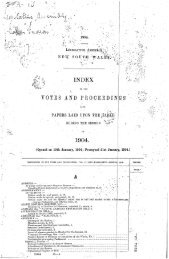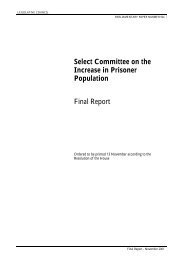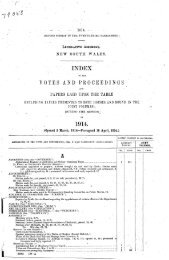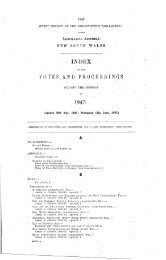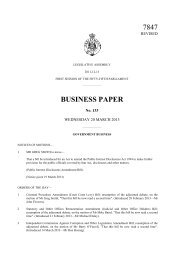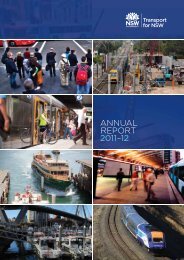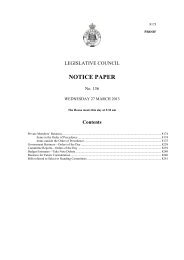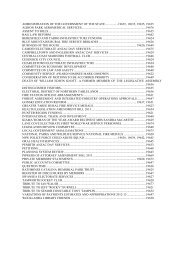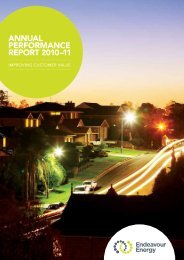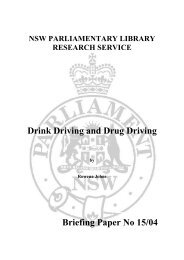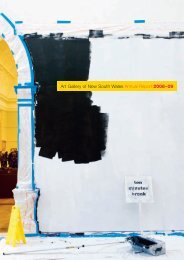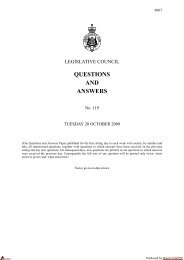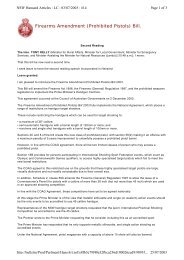Questions & Answers Paper No. 158 - Parliament of New South ...
Questions & Answers Paper No. 158 - Parliament of New South ...
Questions & Answers Paper No. 158 - Parliament of New South ...
You also want an ePaper? Increase the reach of your titles
YUMPU automatically turns print PDFs into web optimized ePapers that Google loves.
7093<br />
LEGISLATIVE ASSEMBLY QUESTIONS AND ANSWERS<br />
MONDAY 12 OCTOBER 2009<br />
Answer—<br />
(1) 0. All placements have been on the basis <strong>of</strong> an application endorsed by the student's parents or carers.<br />
(2) to (5) See above.<br />
(6) In 2008 there were 359 long suspensions from the 35 behaviour schools.<br />
(7) The periods <strong>of</strong> long suspension ranged from 5 to 20 school days.<br />
*7478 CASEMIX OR EPISODE FUNDING FORMULAE—Mrs Jillian Skinner asked the Deputy Premier,<br />
Minister for Climate Change and the Environment, and Minister for Commerce representing the Attorney<br />
General, Minister for Industrial Relations, Minister for Health, Minister for the Central Coast, Vice<br />
President <strong>of</strong> the Executive Council—<br />
(1) What are the plans regarding use <strong>of</strong> Casemix or Episode Funding formulae to allocate resources to<br />
hospitals in NSW?<br />
(2) What variations will be applied to account for the different levels <strong>of</strong> care provided at individual<br />
hospital?<br />
(3) How will impacts, such as remoteness, community disadvantage and other variables, be dealt with?<br />
(4) Are concerns, such as those expressed by the NSW Nurses Associations that Episode Funding<br />
applied to Broken Hill Hospital will mean a cut <strong>of</strong> 37% to the budget, justified?<br />
Answer—<br />
(1) The Episode Funding Model has been a tool used across NSW Health since 2000⁄01. NSW Health<br />
modelled episode (activity-based) funding as a hospital budget-setting tool in 2008⁄09. In 2009⁄10, 75<br />
hospitals are receiving episode funding for their in-scope (acute and⁄or sub and non-acute) patient<br />
activity.<br />
(2) Under the NSW Health Episode Funding policy, public hospitals are grouped according to their<br />
patient and service pr<strong>of</strong>ile. Hospitals in each peer group share the same general operational<br />
characteristics and are treated the same way for the purpose <strong>of</strong> episode funding. Peer hospital groups<br />
facilitate fair comparisons <strong>of</strong> efficiency, quality and other performance parameters between similar<br />
hospitals.<br />
(3) The criteria used for peer grouping <strong>of</strong> public hospitals include:<br />
• Size (number <strong>of</strong> beds, number <strong>of</strong> separations, casemix)<br />
• Specialisation, complexity <strong>of</strong> care (casemix index, range and number <strong>of</strong> different<br />
illnesses⁄procedures managed, proportion <strong>of</strong> surgical separations, patient transfers in (from<br />
another acute care hospitals, Outpatient surgeries)<br />
• Teaching status<br />
• <strong>No</strong>n-acute activity<br />
• Role<br />
• Geography<br />
• Characteristics <strong>of</strong> catchment population<br />
(4) <strong>No</strong>. Episode Funding has not affected the total funds allocated to Area Health Services. Each Area<br />
Health Service has determined the episode funding budget to be allocated to each <strong>of</strong> its in-scope<br />
hospitals according to that hospital's activity targets and peer group pricing for 2009⁄10.<br />
*7479 FUNDRAISING FOR ESSENTIAL HOSPITAL EQUIPMENT—Mrs Jillian Skinner asked the Deputy<br />
Premier, Minister for Climate Change and the Environment, and Minister for Commerce representing the<br />
Attorney General, Minister for Industrial Relations, Minister for Health, Minister for the Central Coast,<br />
Vice President <strong>of</strong> the Executive Council—<br />
Given that the Royal <strong>No</strong>rth Shore Hospital Intensive Care Unit is one <strong>of</strong> the busiest in NSW treating<br />
serious accident victims, severe burns injuries and those patients recovering from major surgery:<br />
(1) Why is the Fundraising Department <strong>of</strong> Royal <strong>No</strong>rth Shore Hospital having to go to the public to ask<br />
for contributions towards essential bedside equipment such as a portable ultrasound machine that<br />
enables highest quality "on screen" guidance for insertion <strong>of</strong> life-saving tubing?<br />
(2) How much money has been raised since the launch <strong>of</strong> this request in May 2009?<br />
Answer—<br />
I am advised:<br />
(1) Strong and healthy communities <strong>of</strong>ten wish to show their appreciation and regard for their local<br />
institutions including hospitals and schools by donating money to purchase extra equipment and<br />
Produced by Alts<strong>of</strong>t Xml2PDF



